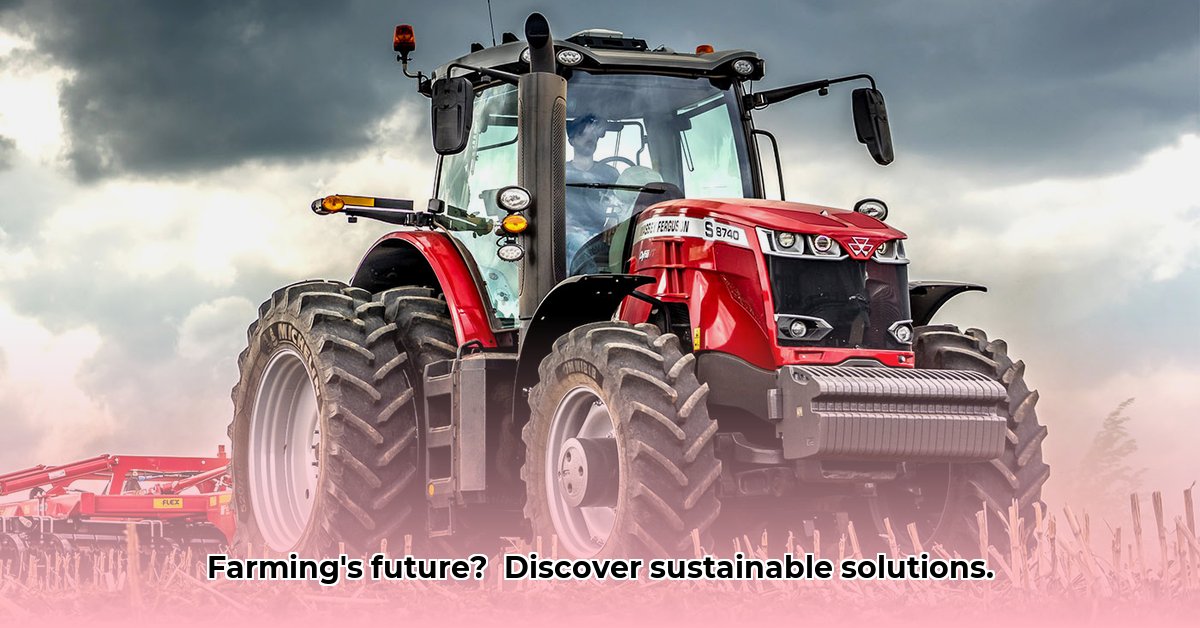
Tractor MF: A Greener Approach to Agriculture
Massey Ferguson (MF) is actively pursuing sustainable farming practices, moving beyond mere pronouncements to tangible changes in tractor design and manufacturing. This commitment focuses on increased efficiency, innovative technologies, and collaborative partnerships within the agricultural industry. How effective are these efforts? Let's delve into the specifics. For farmers considering the financial aspects, check out tractor pricing.
MF Tractors: Efficiency as a Cornerstone
MF's latest tractors—including compact models, enhanced triple mowers, and a new baler—emphasize maximizing output while minimizing resource consumption. This translates to cost savings for farmers in fuel and labor. The strategic decision to discontinue the MF 8700 S tractor underscores a dedication to newer, more sustainable designs. This suggests a long-term commitment to creating a future-proof product line. But does this efficiency translate into measurable environmental gains? Further data is needed to fully assess the environmental impact.
Beyond the Engine: Technological Advancements and Collaboration
MF's sustainability initiative extends beyond engine design. AGCO Beauvais Engineering's research into hydrogen storage for tractors represents a significant leap towards cleaner energy sources within agriculture. Furthermore, the partnership with SDF to develop smaller, more sustainable tractors highlights a commitment to collaborative innovation. This approach promises the development of even more effective solutions for farmers, but the practicality and scalability of these technologies still need evaluation.
Navigating Challenges: Obstacles and Opportunities
While MF's strides in sustainability are notable, significant hurdles remain. The adoption of new technologies by farmers presents a challenge. Furthermore, evolving regulations and economic incentives will greatly influence the widespread acceptance of these innovations. The successful implementation of hydrogen-powered tractors, for instance, hinges on both technological and economic feasibility.
Sowing Good Deeds: A Broader Commitment
MF's "Sowing Good Deeds" program exemplifies a commitment to social responsibility extending beyond profitability. However, to fully demonstrate this commitment, quantifiable results and transparent reporting regarding the program's impact are essential.
A Shared Responsibility: Collaboration for Success
The transition to sustainable farming demands a collective effort. Farmers, dealers, AGCO (MF's parent company), and governments all play vital roles. What specific actions can each stakeholder take?
| Stakeholder | Short-Term Goals | Long-Term Vision |
|---|---|---|
| Farmers | Implement precision agriculture techniques; explore fuel-efficient practices. | Invest in or lease newer, sustainable equipment; participate in training programs. |
| MF Dealers | Provide comprehensive staff training on new equipment and technologies. | Adapt their services to accommodate hydrogen-powered machinery. |
| AGCO (Parent Company) | Continue investing in R&D for clean fuels; explore alternative power sources. | Promote sustainable manufacturing practices throughout the supply chain. |
| Governments | Implement supportive regulations and financial incentives for eco-friendly technologies. | Develop policies that foster hydrogen fuel infrastructure development. |
Assessing Risks: Potential Challenges and Mitigation Strategies
While MF's vision is ambitious, potential roadblocks exist. Here's a risk assessment focusing on key initiatives:
| Technology/Initiative | Likely Success? | Potential Impact | Strategies to Reduce Risk |
|---|---|---|---|
| Hydrogen-powered machinery | Uncertain | Transformative | Phased rollout, robust testing, strategic marketing, and collaboration with infrastructure developers. |
| New MF tractor models | Highly Likely | Significant | Effective marketing campaigns, comprehensive dealer training, and competitive pricing. |
| Sustainable farming initiatives | Potentially High | Broad-reaching | Close collaboration with farmers, data-driven decision-making, and investment in training and support. |
How to Reduce Carbon Footprint Using Massey Ferguson Equipment
Key Takeaways:
- Massey Ferguson's commitment to sustainable agriculture prioritizes fuel efficiency and minimized environmental impact.
- Technological innovations such as advanced engine designs and integrated aftertreatment systems contribute to emissions reduction.
- A holistic, lifecycle approach to sustainability – encompassing manufacturing, usage, and end-of-life management – is essential for lasting impact.
- Farmers can actively contribute through the adoption of precision agriculture techniques and exploration of alternative fuels.
- Transparency in reporting environmental benefits and continuous investment in sustainable manufacturing practices are critical for long-term success.
Fuel Efficiency Innovations: The Foundation of Sustainability
Massey Ferguson's approach to minimizing carbon footprint begins with engine design. Modern MF tractors boast considerable improvements in fuel efficiency, directly translating to reduced greenhouse gas emissions. These advancements stem from optimized engine designs and advanced transmission systems. However, quantifiable data on the magnitude of these reductions is crucial for assessing their overall effectiveness.
Emission Reduction Technologies: Minimizing Environmental Impact
The All-in-One aftertreatment system plays a significant role in reducing emissions. This integrated system functions as a high-efficiency exhaust filter. However, its performance may vary based on operational conditions. Furthermore, the long-term environmental implications of DEF usage and disposal warrant further investigation.
Precision Agriculture: Optimizing Resource Use
Precision agriculture technologies, increasingly incorporated into newer Massey Ferguson models, enable optimized resource management. GPS-guided tractors, for example, reduce fuel consumption and soil disturbance. This targeted approach minimizes both fuel use and environmental impact. But, the long-term economic implications of adopting this technology for farmers require greater clarity.
A Holistic Approach: Considering the Entire Product Lifecycle
Sustainable farming is a holistic endeavor. Massey Ferguson's sustainability efforts must encompass the entire product lifecycle, including manufacturing processes, material sourcing, and responsible end-of-life management – particularly recycling and waste reduction.
The Path Forward: Transparency and Continued Innovation
The agricultural sector needs verifiable data, not just promises. Massey Ferguson needs to transparently report the quantified environmental benefits of its technologies. Independent verification of these claims will bolster trust and encourage wider adoption. Continued investment in R&D for sustainable materials and manufacturing processes is paramount for achieving long-term sustainability goals.